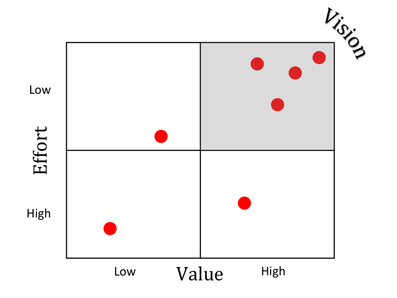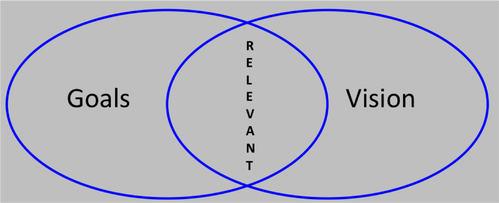
My last three articles have addressed SMART goals and structuring your goals to be Specific, Measurable and Actionable. In this article I am going to discuss the next aspect of SMART, which is to ensure that your goals are Relevant. I will explain why it is important and provide two techniques that you can use to make sure that at any given point in time you are pursuing those goals most relevant to your success.
Why Relevant? Most versions of SMART do not use relevant. In my opinion those versions neglect two key aspects of goal setting, (1) that we all have more goals than the time we have available and (2) that goals are not strictly independent of one another. Versions of SMART that do not use relevant are silent on these issues, providing no guidance on how to evaluate multiple goals. Therefore, to get the most out of goal setting and improve your chances of success, you not only want to make sure your goals are aligned with your vision and your values, but you want to maximize your time and resources to pursue only those goals most relevant to your long-term success. Value and Effort One way to evaluate multiple goals is to place each goal relative to one another on a matrix that looks at perceived value verses effort. When you look across goals, you want to focus your resources pursuing those goals most relevant to your vision that are low effort and high value. To reinforce, the use of the matrix is a relative process. Hopefully any goal you are looking to achieve has a degree of challenge that will involve substantial effort. The method then, when ranking effort, is simply a comparison between competing goals. For instance, I have a goal to publish a book. Should I write a work of fiction that tells a story of an evil mastermind and his plans to conquer the world or should I write a book that explains 7 key psychological principles that you can use to harness the power of the human mind? Both would be a challenge to write, both will take significant effort, but given my values and my background as an educational psychologist, the book about the human mind will take less effort and have a higher value than the work of fiction. The Pareto Principle A second method for determining which goals are most relevant is to use the Pareto principle, also known as the eighty twenty rule. This takes all goals that are under consideration and asks which are the 20% of your goals that will provide 80% of your results. It is this top 20% that are the goals most relevant to your success. This does not mean to discard the remaining goals, simply to hold them in reserve as you pursue your most relevant goals. Periodically, as you accomplish a goal or new ideas present themselves you will want to revisit the Pareto Principle, dusting off old ideas to determine what to pursue next. And an additional use of the Pareto principle is to help manage your resources in pursuit of those most relevant goals. One option is to commit all of your time and energy to the 20% of your goals that are most relevant. However, another option provides a bit more flexibility, committing 80% of your time to the most relevant goals and 20% of your time to goals not necessarily aligned with your vision. The benefit of this arrangement is that it helps focus the majority of resources on the most relevant goals, yet leaves some room to experiment with new ideas. Maybe I can write my book about an evil mastermind after all, it may just take me a lot longer to complete. The Bottom Line If you are anything like me then your to-do-list expands as you pursue multiple goals in life. You have more ideas than hours in the day. But, every idea is not created equal so you need a mechanism to evaluate your ideas and establish those goals most relevant to your success. Two techniques to evaluate multiple goals are: -1- Use the Value/Effort Matrix: this will compare your goals along two criteria to help ensure you are focused on low effort, high value goals. -2- The Pareto Principle: this lists all your goals and then you select the 20% of goals that will give you 80% of your results. In my next article I will be discussing the last aspect of SMART goals, the importance of ensuring that your goals are Time bound.
About the Author
Richard Feenstra is an educational psychologist who at the age of only seventeen became an expert in throwing hand grenades. Richard enjoys sharing the psychology of decision-making with a vision to help transform the world, one decision at a time. This includes writing about scaffolding, cognitive dissonance, cognitive bias or other keywords he wanted to list here in a feeble attempt to influence search engines.
3 Comments
Casandra Morelli
4/10/2020 05:11:30 pm
Thank you for explaining the Pareto principle in a deeper way. It seems like it should be self explanatory but the perspective between the subject of the book helped explain it better, And I would love to read your book on the 7 principles that explain how to harness the power if the human mind ;) Thanks
Reply
4/16/2020 12:44:53 pm
I am glad i found your course on Udemy. It is very helpful especially since i have had trouble when setting up goals. I normally set them then think they are not that important after all. But after putting the insight you provided into action i am able to see that most of my time is actually taken up by things that are not relevant to my goals. I have realised this is why i am always busy and yet i do less by the end of the day, month or year. I would advise anyone taking this course to couple it with time management skills. It will surely yield amazing returns.
Reply
Zoraima
3/17/2021 10:58:00 pm
This trully hit home very well explained sir
Reply
Your comment will be posted after it is approved.
Leave a Reply. |
Authors
Richard Feenstra is an educational psychologist, with a focus on judgment and decision making.
(read more) 
Bobby Hoffman is the author of "Hack Your Motivation" and a professor of educational psychology at the University of Central Florida.
(read more) Archives
April 2023
Categories |


 RSS Feed
RSS Feed
